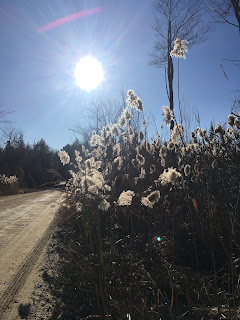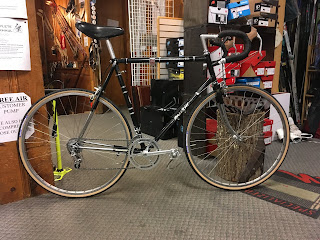A rational bike commuter, riding fairly short distances, gains from the exercise and still has time left over to build the neglected areas. The higher the cycling mileage, the less time is left for other things. These things include supportive conditioning and earning a living.
During my peak riding years, I lived as a form of professional athlete. Working in a shop that sold bike and cross-country ski gear, held weekly rides and gave ski lessons, I was a better asset to the business if I was good at what we did. The pay was meager, but the lifestyle was generally physically beneficial.
Various things intrude on a stable distribution of time. Suffice to say that I eliminated one thing and another, leaving only bike commuting and some extra riding on either end of the height of commuting season. I try to remember to throw in enough stretching and core work to hold things together, but days may pass. At worst they turn into weeks, usually when I'm not getting out to do much of anything.
For the bike portion of my commutes right now, the old mountain bike with studded tires handles the icy areas well, but it feels like I'm in a hamster wheel half submerged in wet cement. I grind away dutifully on every possible day. Mornings I'm rushed. Evenings I'm tired. I feel okay. I don't stretch...
Sunday was a nice day, and the shop was closed. A wintry mix was supposed to move in for the next couple of days, so I zipped out for a tool on the fixed gear, around one of my favorite short rides, Huntress Bridge Road.
The low-angled sun creates a distinctive mood this time of year. It also provides interesting visual effects.
Back at home, I went right into items on the to do list with only a passing swipe at stretching, and no other support strength activities.
Monday dawned gray and raw, as advertised. Having set my mind to indoor pursuits, I sat down to write, moved to a different room, sat down to check emails. The cat got on my lap. I sat a while longer. My weekend is Monday and Tuesday, so it was nothing unusual. I poked around in the kitchen, did some laundry. Sat some more. Got under the cat again. Then I tried to get up.
My lower back seized up. I couldn't stand up straight. I could barely walk. I tried to shape myself into the stretches I knew I needed to do, but it was too late for instant relief. It was too late for any relief. I could only walk in a weird, bent-kneed crouch.
Suspecting the old psoas muscle, I focused on efforts to relax it. They showed some effect, but the knot was the most severe I'd had since I was introduced to the problem several years ago after an outburst of pain that literally dropped me to my knees. About 41 hours later, I'm still not fully functional. Just something simple like splitting a couple of logs for the wood stove becomes a strategic operation.
Back pain can be associated with all sorts of expensive and fatal conditions, as well. Even getting those assessed can be pricey, let alone getting anything treated. I'll take encouragement from the fact that mine is responding at all to my home care. These assurances may be false, but low income people in America have to choose between betting all their financial resources on the health care wheel of fortune or concluding their affairs and leaving whatever nugget they can for any family members they might have. Even concluding your affairs costs money.
Suddenly living in a world tightly confined by pain, you wonder if you'll ever be fully functional again. This is especially true when you become "a senior citizen." When I was in my 20s, I read something that seemed to indicate that we start to die as soon as physical growth stops. Age 30 was held up as the beginning of decrepitude. An active person over 40 was a great inspiration. Then you reach those ages and realize life goes on. Life does go on, as long as you are there to live it. But at a certain point the pains take longer to subside. You have to wear glasses. You have to watch what you eat. People around you start to drop off more frequently. You hear about other people's medical catastrophes, and maybe have some of your own.
Life is a negotiation. You review the terms constantly. What are you willing to accept? What can you enforce?
Work is going to be a challenge today. I can't lift much, and a careless step brings a slap of pain across the lower back. But work is where the money comes from. Things are improving, but I assume nothing. The instantaneous assault of the initial back spasm is just one of many examples of how you can go from high to low in one breath. Then you just have to keep breathing while you figure out what to do next. But that's really just life itself: keep breathing while you figure out what to do next.










